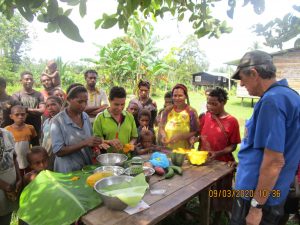
PAPUA NEW GUINEA – ALLEVIATING MALNUTRITION
In October 2018, Dr Russ Stephenson commenced a three-year project made possible with a Rotary Global Grant, in the Strickland Bosavi area, (Western Province) of PNG. An impoverished area, of 184 villages, where an estimated 54% of children are stunted and 14% wasted.
The project was based on the Food Plant Solutions Rotary Action Group philosophy of encouraging consumption of nutritious local foods, rather than introduced new foods or supplements to overcome malnutrition, (making it sustainable). The aim was to improve the nutrition of babies, children under five years old and mothers, reducing infant mortality, morbidity and child malnutrition.
An initial Train the Trainer workshop was held with 55 volunteers from 19 villages. Upon completion the volunteers formed 15 teams of instructors who undertook to teach nutrition workshops in their own, and surrounding villages. These 15 teams of instructors then delivered awareness / information sessions (in ples tok) on improved nutrition, birth control, immunisation, disease treatment, and Water, Sanitation and Hygiene (WASH). These workshops empowered women, which will lead to better nutrition, and ultimately improved physical and cognitive development of their children. Outcomes achieved to date:
- 41 village workshops, attended by 8,369 participants (>25% of the population), representing about 2,030 families.
- Demonstration village home gardens established in 9 villages.
- Talks were given at 6 village schools to teach students about the importance of good nutrition for their development.
- Supplementary seed of nutritious corn, beans, peanuts and coconut were distributed to each household to increase production of nutritious food.
- Reference booklets “Nutritious Food for Stronger Child Growth in Papua New Guinea” and “Notes on Growing More Nutritious Food in Your Garden” were compiled and distributed to each household. Primary School nutrition books were provided to eight schools. A manual for preparation of nutritious baby food was published in English and Biami.
- Nineteen 15-minute programs of project lessons were broadcast on Radio Biami, in both English and the Bedamuni (Biami) language.
- 2 workshops were held for village women on preparation of locally available, nutritious baby foods, which saw babies enthusiastically consume the food their mothers prepared.
Due to the success, but also the need, plans have been developed to extend and expand this project. This will only occur with additional funding, which is yet to be achieved. A full report is available on this project, please contact us for more details. E:info@foodplantsolutions.org